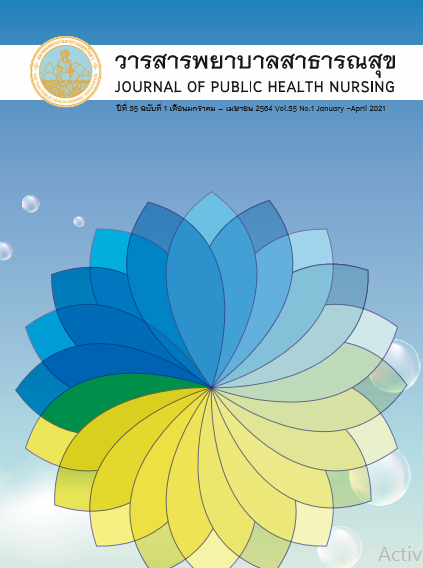Effects of Behavioral Modification Program on Medication Adherence among Uncontrolled Hypertension Patients Nawa District, Nakhon Phanom Province
Keywords:
Program of Medication adherence, Drug use behavior, Uncontrolled Hypertension, Transtheoretical ModelAbstract
Medication adherence is an important health behavior in the treatment of uncontrolled hypertension. The objectives of this quasi-experimental research were to compare the effects of behavioral modification program on: 1) drug use behaviors, medication adherence, and blood pressure level before and after intervention in the experimental group; and 2) drug use behaviors, medication adherence, and blood pressure level after the intervention between the experimental group and the comparison group. Purposive sampling was used to select subjects according to inclusion criteria. The experimental group comprised of 30 patients who received hypertension treatment at the Donsala Subdistrict Health Promotion Hospital. The comparison group comprised 30 patients who received hypertension treatment at the Thareua Subdistrict Health Promotion Hospital. The study was conducted during February and March 2020. The experimental group received an eight week intervention applying the Transtheoretical Model which includes stages of change. Program activities included education, use of the model, drug label pictures, a medication calendar, a SMS by the Line phone application, awarding, and a home visit. The comparison group received usual care. Data were presented by percentage, mean, standard deviation, Chi-square, Paired t-test, Independent t-test, Wilcoxon Signed Ranks test, and Mann-Whitney U test.
Findings showed: 1) After intervention, the experimental group had significantly higher scores on therapeutic drug use behaviors and medication adherence and had lower blood pressure levels than before (p < 05), 2) After intervention, the experimental group had significantly higher therapeutic drug use behaviors and medication adherence and lower blood pressure levels than the comparison group (p < 05).
References
World Health Organization (WHO). A global brief on hypertension silent killer, global public health crisis [Internet]. 2013 [cited 2018 July 30]. Available from: http://www.who.int/cardiovasculardiseases/publications/global_brief_hypertension/en/.
Division of Non Communicable Diseases Ministry of Public Health. Number and Morbidity rate in 2016-2018 [Internet]. 2018 [cited 2020 March 10]. Available from: http://www.thaincd.com/2016/news/hot-news-detail.php?id=13683&gid=18
Thai Hypertention Society, National Health Security Office. 2019 Thai Guideline on The Treatment of Hypertention: Sahamitr Printing & Publishing; 2019. p. 1-2
Brown MT, Bussell JK. Medication adherence: WHO cares? Mayo Clinic Proceedings 2011; 86(4): 304-14.
Bosworth HB, Granger BB, Mendys P, Brindis R, Burkholder R, Czajkowski SM, et al. Medication Adherence: a call for action. American heart journal 2011; 162(3): 412-24.
Osterberg L, Blaschke T. Adherence to Medication. New England journal of medicine 2005; 353(5): 487-97.
Contreras EM, Claros NM, Guillenc VG, Wichmann MF, Jose Martinez JC, Pablos JM, et al. Efficacy of a home blood pressure monitioring programme on therapeutic compliance in hypertension: the EAPACUM-HTA study. Journal of hypertension 2006; 24(1): 169-75.
Patel MX, David AS. Medication adherence: predictive factors and enhancement strategies. Psychiatry 2007; 6(9): 357-61
Baune BT, Aljeesh Y, Bender R. Factors of non - compliance with the therapeutic regiment among hypertensive men and women: a case - control study to investigate risk factors of stroke. Eur J Epidemiol 2005; 20(5): 411-9.
Burnier M. Medication Adherence and Persistence as the Cornerstone of Effective Antihypertensive Therapy. American Journal of Hypertension 2006; 19(1): 1190-6.
Nantaluck S. Medication non adherence. Thai Bulletin of Pharmaceutical Sciences 2012; 7(1): 1-11. (in Thai)
Nanthikarn W, Umaporn P, Maithai S. Effect of Behavioral Modification Program on Medical Adherence and Blood Pressure for Muslim Elderly with Uncontrolled Hypertention. [Thesis]. Master of Nursing Science Program in Community Nurse Practitioner Prince of Songkla University; 2015.
Nakhonphanom Provincial Health Office. Non-communicable disease data warehouse system, Nakhon Phanom Province [Internet]. 2017 [cited 2017 March 10] Available from: https://www.npm.moph.go.th/home.php
Arpaporn P, Surintorn K, Sunee L, Tassanee R. Health promotion and disease prevention in the communityAn Application of concepts and Theories to practice. MN Compu of set; 2018.
Yosapon L, Sakorn P, Sombat L, Yupathorn S. Influence of beliefs about medication on high group of medication adherence in hypertensive patients. J Prapokklao Hosp Clin Med Educat Center 2013; 30(2): 146-57.
Nittayathip S, Chuenjit P, Somsiri N. Effect of Drug use Behaviors Promotion Program in Elderly Patients with Non-Communicable diseases Khemarat District Ubonratchatani Province. [Thesis]. Master of Nursing Science in Community Health Nurse Practitioner School of Nursing Sukhothai Thammathirat Open University; 2018.
Bandura A. Social foundations of thought and action: A social cognitive theory. Prentice-Hall, Inc; 1986.
Bandura A. Self – efficacy: Mechanism in human agency. American Psychologist 1982; 37(2): 122-47.
Morisky DE, Ang A, Krousel-wood M, Ward H. Predictive Validity of a Medication Adherence Measure for Hypertension Control. Journal of Clinical Hypertension 2008; 10: 348-54.
Contreras EM, Claros NM, Guillenc VG, Wichmann MF, Jose Martinez JC, Pablos JM, et al. Efficacy of a home blood pressure monitoring program on therapeutic compliance in hypertension: the EAPACUM-HTA study. Journal of hypertension 2006; 24(1): 169-75.
Hacihasanoglu R, Gozum S. The effect of patient education and home monitoring on medication compliance, hypertension management, healthy lifestyle behaviors and BMI in a primary health care setting. Journal of Clinical Nursing 2010; 20(5-6): 692-705.
Maimuna S. Development and Evaluation of a Self-management Support Program on Medication Adherence and Blood Pressure among Older Adults with Uncontrolled Hypertension. The 8th STOU National Research Conference; 2018 November 23; Sukhothai Thammathirat Open University; 2018. p. 329-45
Downloads
Published
How to Cite
Issue
Section
License
บทความที่ตีพิมพ์และแผนภูมิรูปภาพถือเป็นลิขสิทธิ์ของวารสารพยาบาลสาธารณสุข (Thai Public Health Nurses Association)







